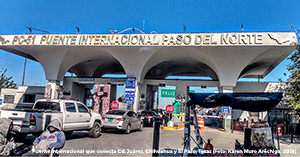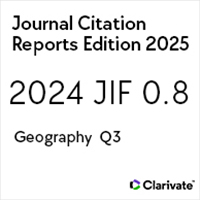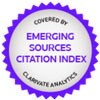Mexicans deported from the United States to Ciudad Juarez for driving under the influence of alcohol
Mexicanos deportados de Estados Unidos a Ciudad Juárez por conducir bajo la influencia del alcohol
https://doi.org/10.21670/ref.2118081
Keywords:
migration, deportation, alcoholism, Mexico, United StatesAbstract
This article analyzes the legislative, social, and economic factors that explain why a high number of Mexican citizens have been removed from the United States under the accusation of driving a vehicle under the influence of alcohol. To this end, the recent transformation of United States immigration policy is analyzed to examine, through semi-structured interviews, the deportation processes of 23 Mexican men who were expelled to Ciudad Juarez, Chihuahua, Mexico accused of this crime in 2019. The findings reveal that the interviewees had different levels of alcohol consumption and that most of them had started this practice in the United States. On the other hand, there is evidence of the leading role of local police officers acting as “immigration police” and that the longer immigrants reside in the United States, the greater their propensity to engage in risky behaviors such as alcohol abuse.Resumen
En este artículo se analizan los factores legislativos, sociales y económicos que explican por qué un alto número de ciudadanos mexicanos han sido deportados formalmente de Estados Unidos bajo la acusación de conducir un vehículo bajo la influencia del alcohol. Para este fin, se analiza la transformación de la política de inmigración de Estados Unidos para examinar, a través de entrevistas semiestructuradas, los procesos de deportación de 23 hombres mexicanos que fueron expulsados a Ciudad Juárez, Chihuahua, México acusados de este delito en 2019. Los hallazgos revelan que los entrevistados tenían distintos niveles de consumo de alcohol y que la mayoría había iniciado dicha práctica en ese país. Se evidencia el papel protagónico de ofíciales de policías locales que actúan como “policías de inmigración” y el que a mayor tiempo de residencia de los inmigrantes en Estados Unidos mayor es la propensión a tener comportamientos de riesgo como el abuso del alcohol.References
Alarcón, R. & Becerra, W. (2012). ¿Criminales o víctimas? La deportación de migrantes mexicanos de Estados Unidos a Tijuana, Baja California. Norteamérica, 7(1), 125-148. https://www.revistanorteamerica.unam.mx/index.php/nam/article/view/160
Borges, G., Medina-Mora, M. E., Breslau, J. & Aguilar-Gaxiola, S. (2007). The effect of migration to the United States on substance use disorders among returned Mexican migrants and families of migrants. American Journal of Public Health, 97(10), 1847-1851. https://doi.org/10.2105/AJPH.2006.097915 DOI: https://doi.org/10.2105/AJPH.2006.097915
Borges, G., Rafful, C., Tancredi, D. J., Saito, N., Aguilar-Gaxiola, S., Medina-Mora, M. E. & Breslau, J. (2013). Mexican immigration to the US, the occurrence of violence and the impact of mental disorders. Brazilian Journal of Psychiatry, 35(2), 161-168. https://doi.org/10.1590/1516-4446-2012-0988 DOI: https://doi.org/10.1590/1516-4446-2012-0988
Cárdenas Montaño, M. & Alarcón Acosta, R. (2017). Historias de vida de deportados, centroamericanos en tránsito y solicitantes de asilo en Casa del Migrante de Tijuana (2013-2016). En Casa del Migrante en Tijuana, A. C., Vidas en vilo. Historias y testimonios de migrantes internacionales (pp. 101-215). Ediciones ILCSA. https://www.academia.edu/42738022/_Historias_de_vida_de_deportados_centroamericanos_en_tr%C3%A1nsito_y_solicitantes_de_asilo_en_Casa_del_Migrante_de_Tijuana_2013_2016_
Coubès, M.-L. (2018). Deportaciones de mexicanos desde Estados Unidos: ¿qué está cambiando con el nuevo gobierno de Estados Unidos? Coyuntura Demográfica, (13), 87-95. http://coyunturademografica.somede.org/wp-content/plugins/coyuntura_demografica/DEMOGRAFICA/ARTICULOS/PUB-2018-13-152.pdf
Denzin, N. K. & Lincoln, Y. S. (1995). Editors’ Introduction. Qualitative Inquiry, 1(1), 3-6. https://doi.org/10.1177/107780049500100101 DOI: https://doi.org/10.1177/107780049500100101
EFE. (2019, 22 de mayo). El DUI, la herramienta “exprés” del gobierno para deportar inmigrantes. https://www.efe.com/efe/usa/inmigracion/el-dui-la-herramienta-expres-del-gobierno-para-deportar-inmigrantes/50000098-3982603
El Colegio de la Frontera Norte. (2019, julio-septiembre). Boletín Emif Norte. Encuesta sobre Migración en la Frontera Norte de México. Reporte trimestral de resultados. https://www.colef.mx/emif/datasets/boletines/norte/2019/Emif%20Norte%20Boletin%20T3%202019.pdf
Finnegan, W. (2013, 22 de abril). The deportation machine. A citizen trapped in the system. The New Yorker (Annals of immigration, 29 de abril). https://www.newyorker.com/magazine/2013/04/29/the-deportation-machine
Fitzgerald, D., & Alarcón, R. (2013). Migration: policies and politics. En P. H. Smith & A. Selee (Eds.), Mexico and the United States: The politics of partnership (pp. 111-138). Lynne Rienner Publishers.
Hagan, J. M., Rodriguez, N. & Castro, B. (2011). Social effects of mass deportations by the United States government, 2000-10. Ethnic and Racial Studies, 34(8), 1374-1391. https://doi.org/10.1080/01419870.2011.575233 DOI: https://doi.org/10.1080/01419870.2011.575233
Medina-Mora, M. E., Natera, G. & Borges, G. (2002). Alcoholismo y abuso de bebidas alcohólicas. Observatorio mexicano en tabaco, alcohol y otras drogas. Conadic-Secretaría de Salud México. http://conadic.salud.gob.mx/pdfs/publicaciones/obs2002_1.pdf
Meissner, D., Kerwin, D. M., Chishti, M. & Bergeron, C. (2013). Immigration enforcement in the United States: The rise of a formidable machinery. Migration Policy Institute. https://www.migrationpolicy.org/sites/default/files/publications/enforcementpillars.pdf
Portes, A. & Rumbaut, R. G. (2001). Legacies: the story of the immigrant second generation. University of California Press.
Rocha Romero, D. & Ocegueda Hernández, M. T. (2013). Después de tantos años me deportaron. Proceso de identificación y deportación de mujeres inmigrantes no delincuentes. Estudios Fronterizos, 14(28), 9-34. https://doi.org/10.21670/ref.2013.28.a01 DOI: https://doi.org/10.21670/ref.2013.28.a01
Rumbaut, R. G. (1997). Assimilation and its discontents: between rhetoric and reality. International Migration Review, 31(4), 923-960. https://doi.org/10.2307/2547419 DOI: https://doi.org/10.1177/019791839703100406
Smith, P. (1998). The new American cultural sociology. Cambridge University Press. https://doi.org/10.1017/CBO9780511520808 DOI: https://doi.org/10.1017/CBO9780511520808
































